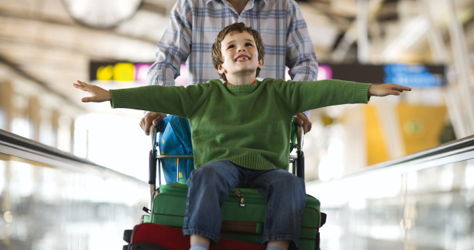Share the excitement and avoid the stress
Most of us going abroad will do so by airplane and your little pilot will most of the time be in awe of this new way of travelling.
At a glance
- Fly at night as babies and toddlers are more likely to sleep
- You will be able to use your buggy right up to the departure gate
- Take some books or toys to keep little ones entertained

Following a few simple tips means you too can share their excitement and get into the holiday mood, while parents of younger babies can avoid stress too.
Check before you fly
If you are planning to take teeny tiny passengers on a plane – under a week – then bear in mind some airlines may insist a newly born baby and mum have a GP's note to say they are fit to fly before they will allow them on board. Check with the airline before booking your tickets to avoid problems at check-in.
Do I need to pay for a ticket?
Most airlines will have a small charge for carrying an infant under two, but will not charge for a full ticket if the infant doesn’t take up a seat. Traditional airlines will offer lower fares for children generally up until the age of twelve. No frills carriers do not give discounted child fares so traditional carriers can often be more competitive on price for families, particularly if you are checking in hold luggage. If you’re on a long-haul flight, consider pre-booking a cot.
For long-haul flights try and take a night flight, babies and toddlers are more likely to sleep and they can actually find the aircraft engine hum soothing.
In the airport you will be able to use a buggy right up to the departure gate at which point the airline staff will place it in the hold.
What you can take through security
In spite of the stringent security on flights you are allowed to take baby food, milk and sterilised water in your hand luggage. You are allowed to take enough for the journey. In some cases this may be over 100ml. The adult carrying the baby food or milk may be asked to verify it by tasting, so you may need a strong stomach.
Don’t forget to also pack extra nappies and baby wipes into your hand luggage in case of delays, plus their favourite toys.
Flying
If your baby screams and cries while flying, this may be caused by pressure build up in the ear, particularly during take-off and landing. This can be avoided by giving them something to suck on and obviously if you are breast feeding this is an option too. For older children a sweet or lolly will do the trick, many airlines will provide these free.
Pack your child’s favourite snacks so that you have food to hand if they want something to eat quickly. If they’re having an inflight meal, be prepared with alternatives in case they don’t like what they’re given. Ask cabin crew to heat baby’s food and milk well in advance of when you need it so that you have it ready for when the baby wants it.
Keeping little ones entertained
Keeping a child entertained on board is essential to ensure a stress free flight. If you are flying long-haul most airlines will have an individual entertainment module with dedicated children’s channels. But also take a book with you to read with them, even very young children can be entertained for hours this way.
Once you have arrived, all of you will want to get to your accommodation quickly and with as little hassle as possible. This is where package holidays can be a fantastic for families, particularly late at night, as a friendly rep will steer you to your coach rather than you having to sort out a taxi or car hire with tired irritable kids wanting to get to bed as soon as possible.